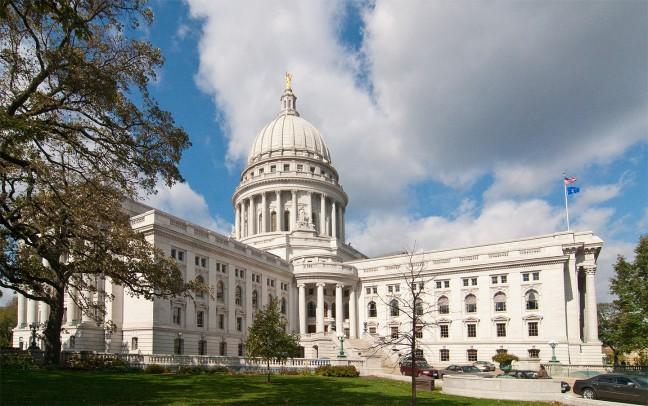In order to pass a contentious state budget that has been stalled for nearly two months, the state Legislature’s Joint Finance Committee passed a series of motions Tuesday and Wednesday.
On Tuesday, JFC passed an infrastructure package which included a plan for funding infrastructure throughout the state. The committee also approved a resolution which cuts property taxes for businesses by roughly $75 million Wednesday.
JFC also rejected a proposal introduced by Gov. Scott Walker to cut income tax Wednesday.
The transportation package, which was supported by all twelve Republicans and opposed by all four Democrats on JFC, included changes to Walker’s proposed budget.
The new plan included a decision to borrow $400 million for transportation, which is roughly $100 million less than what Walker proposed in his budget earlier this year.
The approved plan increases fees for hybrids and electric vehicles, cuts to funding for highway maintenance and construction and abolition to minimum wage law for public works projects.
It also included cuts to highway construction projects outside of southeast Wisconsin, which were proposed in Walker’s budget. These cuts amount to roughly 16 percent less than what Walker proposed, which translated to more than $100 million.
Additionally, when compared to Walker’s proposed budget, highway rehabilitation projects will face a 5 percent cut, which translated to more than $80 million.
Moreover, owners of electric vehicles will face a fee of $100 and hybrid vehicle owners will face a fee of $75 as a part of the new plan, which is something Walker signaled his support for in his budget proposal earlier this year.
Rep. Amy Loudenbeck, R-Clinton, supported the rationale behind this policy, which cites the considerably lower or entirely absent fuel taxes that owners of hybrid and electric vehicles pay when compared to owners of fuel-powered cars.
“Today we took steps to help the transportation fund by reducing the amount of bonding, and increasing revenue slightly with a hybrid/electronic vehicle fee,” Loudenbeck said in a statement.
Rep. Gordon Hintz, D-Oshkosh, expressed his frustration at what he said was as “inaction” on the part of Republicans, who control the state legislature and the governorship in Wisconsin.
Additionally, Rep. Peter Barca, D-Kenosha, expressed his displeasure at what he viewed as an “unsatisfactory result” after months of debate over the state budget, blaming Republicans for a bill that he said was unsustainable and “strips power” from local governments.
But, Walker expressed support for what he said was fiscally responsible in the Committee’s plan.
“This budget includes more transportation funding for all levels of government to provide better roads and bridges, the most funding in our history for state highway rehabilitation, and historically low levels of borrowing,” Walker said in a statement. “We did this all without raising taxes.”
On Wednesday night, JFC decided to approve resolutions which would cut the personal property tax by $75 million. On the same night, the JFC rejected proposals introduced which would cut income tax and increase distribution of earned tax credits.
The personal property tax cuts will focus on property not categorized as manufacturing products under state law.
Sen. Alberta Darling, R-River Hills, viewed the tax as a burden on small businesses and believe these cuts will help businesses succeed.
“These small business people are not wealthy people, they are middle class people who bear the burden of the personal property tax,” Darling said.
Earlier this year, Walker proposed a $200 million income tax cut and a $22 million tax holiday for the back-to-school months.
Additionally, Walker proposed increasing the earned tax credits that low-income individuals can receive from the state government.
The Committee rejected these proposals to the Democrats unanimous disapproval.
“At the end of the day, a budget is about priorities,” Shankland said. “We should be prioritizing the average citizen in the state of Wisconsin.”
The Committee has not yet finalized its budget decisions, but it expects to finalize it within the next few days and send it to Legislature as part of a wider vote on the entire budget.


